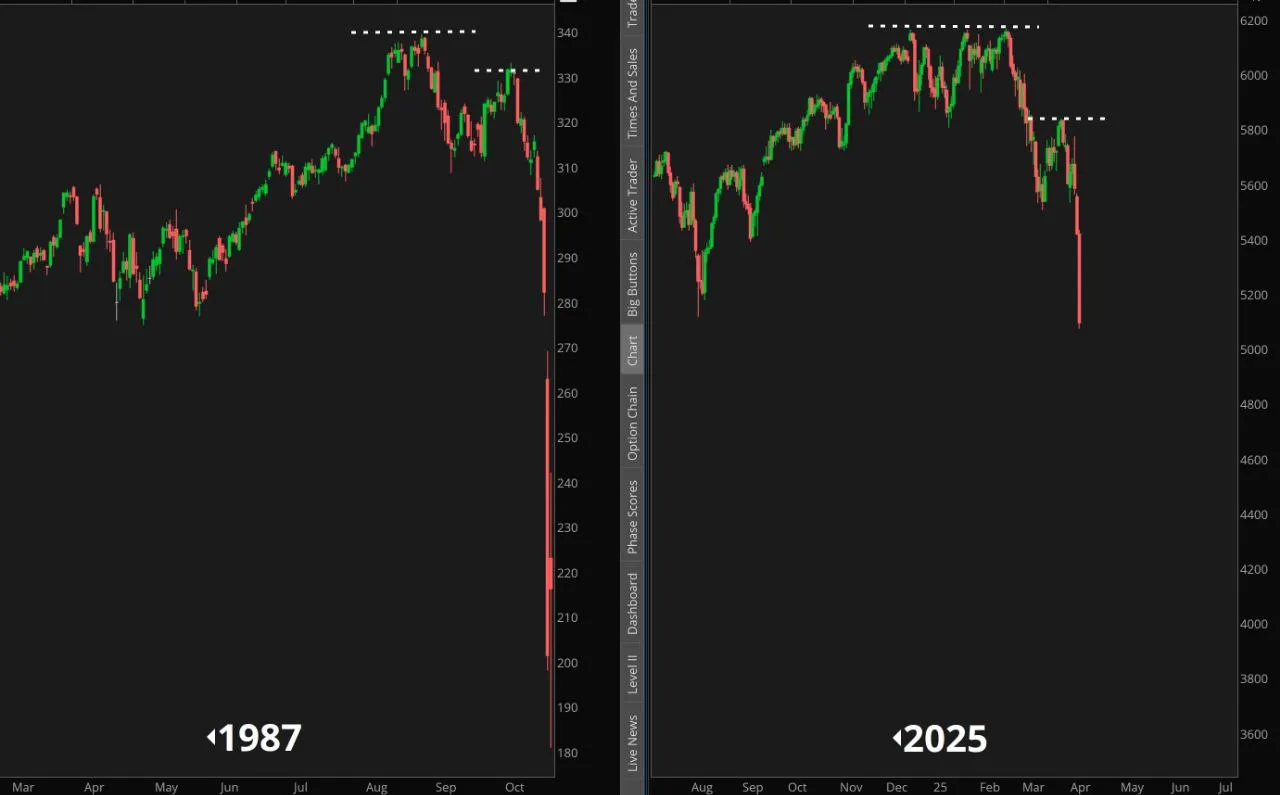Der Dow Jones Index hat seit der Ankündigung der US-Zölle etwa 12% verloren, Bitcoin circa 14% und ist heute auf 75,000 gefallen.
Am Schwarzen Montag 1987 ist der Dow Jones an einem Handelstag sogar um 22% gecrasht, was der größte Crash in der Aktiengeschichte war.
Von diesem Szenario sind wir zum Glück noch weit entfernt, aber gut sieht es an den Börsen gerade nicht aus. Zölle sind heftiger ausgefallen als gedacht.
Die Berechnung ist auch total skurril. Die Handelsbilanz rechnet nur physische Waren aber keine Dienstleistungen und Zahlungsströme in den US-Kapitalmarkt mit ein. Dienstleistungen werden im Informationszeitalter immer wichtiger.
Die EU rechnet aufgrund des Zollkriegs mit den USA mit einem Rückgang der Wirtschaftsleistung um einige Zehntel Prozentpunkte, in den USA könnten es etwas mehr werden. Das ist nicht sehr viel, berücksichtigt aber die Sekundäreffekte nicht.
Und die wirtschaftliche Lage ist in der EU im Moment auch nicht besonders gut.
Wie sollte die EU eurer Meinung nach auf den Zollkrieg reagieren?
Es gibt drei Möglichkeiten:
Erstens, reziproke Zölle von 20% auf alle US-Produkte im selben Ausmaß einzuführen, wie das die USA machen. Das könnte die Situation weiter eskalieren, da Trump die Zölle dann vielleicht noch weiter anhebt. Eine wirkliche Lösung ist es auch nicht.
Zweites Szenario wäre überhaupt alle Zölle zu streichen und eine Freihandelszone mit den USA auszuverhandeln. Aber das will die EU wahrscheinlich auch nicht wirklich, da sie ebenfalls ihre Industrien teilweise mit Zöllen oder höheren Anforderungen schützen möchte.
Drittes Szenario, das im Moment am Wahrscheinlichsten ist, sind Gegenzölle nur auf bestimmte US-Produkte wie Harley-Davidson, Whisky etc. einzuführen oder Zölle auf Big-Tech auszuweiten (Digitalsteuer), um Druck auf die US-Regierung auszuüben. Aber auch das könnte die Situation eskalieren, vor allem da die EU in vielen Bereichen von US-Services und seit dem Ukraine-Kreig auch von Energie- und Militärlieferungen stark abhängt. Trump würde sagen, die EU hat keine guten Karten.
Insgesamt keine einfache Situation. Ein Dilemma. Wie denkt ihr, soll die EU auf den US-Zollkrieg reagieren?
Black Monday 2.0?

https://x.com/PawlowskiMario/status/1909016009060589585
https://x.com/Microinteracti1/status/1909119576236827013
https://x.com/vikisecretscom/status/1909171358623211837
https://x.com/pushpendrajifan/status/1908474058456379570
English
The Dow Jones Index has lost around 12% since the announcement of the US tariffs, Bitcoin around 14% and has fallen to 75,000 today.
On Black Monday 1987, the Dow Jones even crashed by 22% in one trading day, which was the biggest crash in stock market history.
Fortunately, we are still a long way from this scenario, but things are not looking good on the stock markets at the moment. Tariffs have turned out to be more severe than expected.
The calculation of US tariffs is also quite bizarre. The trade balance only includes physical goods but not services and payment flows into the US capital market. Services are becoming increasingly important in the information age.
Due to the tariff war with the US, the EU is expecting a drop in economic output of a few tenths of a percentage point, while in the US it could be slightly more. That is not very much, but it does not take into account the secondary effects.
And the economic situation in the EU is not particularly good at the moment either.
How do you think the EU should react to the tariff war?
There are three options:
Firstly, to introduce reciprocal tariffs of 20% on all US products to the same extent as the US is doing. This could escalate the situation further, as Trump might then raise the tariffs even further. It is not a real solution either.
The second scenario would be to scrap all tariffs altogether and negotiate a free trade zone with the US. But the EU probably doesn't really want that either, as it also wants to protect some of its industries with tariffs or higher requirements.
The third scenario, which is the most likely at the moment, is to introduce counter-tariffs only on certain US products such as Harley-Davidson, whisky etc. or to extend tariffs to big tech (digital tax) in order to exert pressure on the US government. But this could also escalate the situation, especially as the EU is heavily dependent on US services in many areas and, since the Ukraine war, also on energy and military supplies. Trump would say that the EU does not have good cards.
Not an easy situation overall. A dilemma. How should the EU react to the US tariff war?